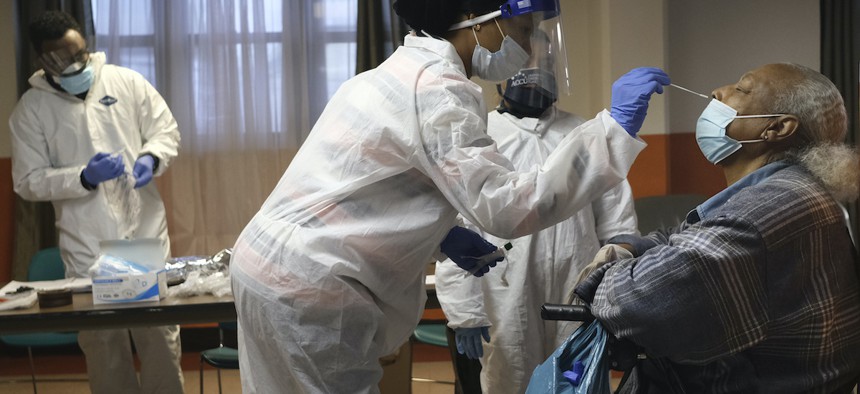State Lawmakers Advance Bills to Protect Workers and Residents at Nursing Homes

Mary Mack, right, a resident of senior housing, is tested for Covid-19 in Paterson, N.J., Friday, May 8, 2020. Associated Press
Lawmakers in New Jersey last week moved legislation meant to curb Covid-19's spread in nursing homes and care facilities, including proposals to prioritize PPE and require increased wages for health workers.
New Jersey lawmakers last week advanced multiple pieces of legislation aimed at increasing safety in long-term care facilities, which are associated with more than 7,000 of the state’s nearly 16,000 confirmed Covid-19 fatalities.
The Health, Human Services and Senior Citizens committees in both the Senate and the Assembly approved seven bills apiece, addressing everything from personal protective equipment to hazard pay for employees at nursing homes and other long-term care facilities. Many of those proposals incorporated recommendations from a June report commissioned by Gov. Phil Murphy that examined the response to the pandemic in the state’s care facilities, which supporters said provided a framework for improvements going forward.
“The fatal consequences of the Covid pandemic fell the hardest on nursing homes, veterans’ homes and other long-term care facilities that are home to our most vulnerable population of New Jersey’s residents,” Sen. Joe Cryan, a Democrat who sponsored or co-sponsored three of the bills, said in a statement. “There are hard lessons to be learned that we should use to be prepared for a possible second wave and to help prevent this from happening again. These proposals can begin the process of developing action plans to protect the health and the lives of employees and residents of long-term care facilities.”
The approved proposals included a plan to prioritize distribution of personal protective equipment from New Jersey’s stockpile directly to care facilities. As amended, the legislation would require that the state make as much equipment available as needed for workers at nursing homes, home health agencies, group homes and long-term care facilities during public health emergencies.
That provision is necessary due to the “unique challenges” faced by those facilities, the legislation says, including “vulnerable patient populations” and physical layouts that can make it difficult to quarantine patients.
During Covid-19, “many facilities suffered from a lack of personal protective equipment, but the cost of personal protective equipment places an additional burden on an already financially constrained long-term care facility industry,” the bill says.
Both long-term care facilities and the state were criticized for the way Covid spread earlier in the pandemic, when New Jersey was one of the states hit particularly hard by the disease. The report commissioned by the state noted that New Jersey nursing homes, which employ 54,000 workers and are home to over 45,000 residents, had a history of failing to contain infection outbreaks and suffer from staffing shortages. But the report also criticized the state, saying agencies failed to provide "meaningful oversight" of homes and did not have a preparedness plan in place.
The PPE bill, approved unanimously by both the House and Assembly health committees, comes as New Jersey is adding to its stockpile of protective gear with the goal of having a “strong three-month supply” to help fortify hospitals and health-care workers in case of a second outbreak, Murphy said at a news briefing Friday.
As of last week, the state had 4.7 million N95 masks and 1 million surgical masks in stock, with 12 million more scheduled to be delivered within the next month. The warehouse also holds 1.7 million face shields, 1.9 million gloves (with an additional 75 million en route) and 2.1 million hospital gowns (and an extra 1 million on order).
“We cannot again find ourselves in the situation we were all in a few months ago, relying only on the federal government or on corporate and philanthropic partners,” Murphy said. “We need to have PPE at the ready and capable of being deployed at a moment’s notice.”
Other legislative proposals approved by committee members Friday include a plan to grant paid sick leave to employees at care facilities, a requirement that nursing homes make plans to prevent residents from becoming isolated and depressed and a bill to increase by $3 per hour the minimum wage for staff members who directly interact with residents. That proposal would also adjust the minimum wage each year to account for cost-of-living increases.
Kate Elizabeth Queram is a staff correspondent for Route Fifty and is based in Washington, D.C.
NEXT STORY: Why Do Some People Get Infected by Coronavirus but Don't Get Sick?





